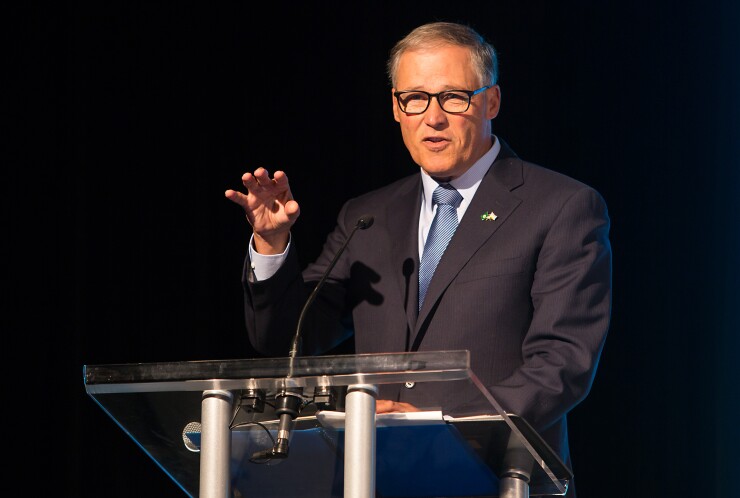Municipalities in Washington have much at stake during the state legislature’s short session, including questions of education funding, revenue sharing and whether lawmakers can reach a compromise on a capital budget that would pump millions of dollars into infrastructure projects.
The legislature convened Jan. 8 to consider a supplemental budget, which Washington does in between the adoptions of its two-year budgets.
These sessions are capped at only 60 days, but Washington localities are hoping for good news on education funding, marijuana revenue sharing, and the adoption of a capital budget that would allow debt issuance for public needs.

Gov. Jay Inslee’s proposed supplemental budget, introduced last month, would add more than $1 billion of spending on top of the $43.7 billion two-year 2017-2019 state operating budget adopted last year.
The vast majority of the increased spending would come from Inslee’s proposal to use reserves to make a one-time, $950 million investment in K-12 education to finish off spending increases required by the Washington Supreme Court in its 2012 decision in McCleary v. State of Washington. The court found that the state had been violating its constitutional duty to provide adequate funding for basic education, and since 2015 the court has been fining the state $100,000 a day.
The state has added more than $5.6 billion in new K-12 spending since 2013. Analysts never saw much danger for the state’s credit from either the increased spending or the fines, but the spending increases are generally good news for school districts and their investors because those districts become less reliant on increasing local tax levies to raise revenue.
Beyond education, state lawmakers have a number of other items on their plates that localities are keeping their eyes on.
The sharing of marijuana revenues is one such item of interest, said Association of Washington Cities general counsel Sheila Gall. State law provides that beginning in fiscal year 2018, if marijuana excise tax collections deposited into the general fund in the prior fiscal year exceed $25 million, then each fiscal year the legislature must appropriate 30% of all marijuana excise taxes deposited into the general fund the prior fiscal year to the treasurer for distribution to counties, cities, and towns.
The state’s collections far exceeded the necessary excise tax threshold, and Gall said localities stand to see their cut increase from $6 million to $15 million per year.
Perhaps the most anticipated discussion going on in the state capital of Olympia is a hold-over from failed negotiations in the previous session: the capital budget.
Despite three special sessions, lawmakers were unable to reach a deal for a $4 billion capital budget: the money that pays for state-authorized and often bond-funded projects such as schools, parks, and state assistance to local projects. Following that failure, Washington treasurer Duane Davidson warned that potential new capital projects wouldn’t be able to receive financing, though projects already under construction would probably not be meaningfully affected.
The problem confronting lawmakers is a combination of legal and political issues stemming from a Washington State Supreme Court decision in October 2016.
In Whatcom County v. Hirst, Futurewise, et al., the state’s top court ruled that that the county failed to comply with legal requirements to protect water resources and needed to make its own determination about water availability, rather than relying on the state Department of Ecology. The ruling means that unless the legislature passes a new law superseding the court’s ruling, Washington counties must now make an independent decision about legal water availability before they can issue building permits that would rely on a well.
The issue, crucial to rural counties and property owners, swiftly became a political flashpoint in the third special session. Republicans and Democrats blamed each other for the failure to pass either a water rights bill addressing the Hirst decision or a new capital budget.
Republicans had insisted that a water rights bill pass before a capital budget could be addressed. In his State of the State address earlier this month, Inslee, a Democrat, urged lawmakers to tackle the capital budget issue quickly and decisively.
Control of the state Senate flipped to the Democrats in a November special election.
“This budget supports more than 19,000 construction jobs in every corner of the state,” Inslee said. “It would help us build more affordable housing and expand capacity in our mental health system. This funding is languishing at exactly the same time the need for these projects is exploding. In Yakima, students are waiting for renovations to alleviate overcrowding at East Valley High School. In Sequim, biologists are waiting for upgrades at the Dungeness Hatchery to improve fish passage. In Ephrata, the community is waiting for the replacement of an aging water line. If you want to help rural Washington — if you want more affordable housing, better mental health care and school construction — then do something about it and send this capital budget to my desk now.”
Gall said that cities were particularly interested in the money that would be used to assist local projects in combination with local funding.
Lawmakers have been making progress on the capital budget. As of Thursday, Senate Bill 6090, a $4 billion capital budget plan, had passed through committee and was awaiting approval by a second committee before heading to the Senate floor.
The last day allowed for the regular session under the state constitution is March 8, but Inslee can call for additional special sessions if necessary, as he did last year.





